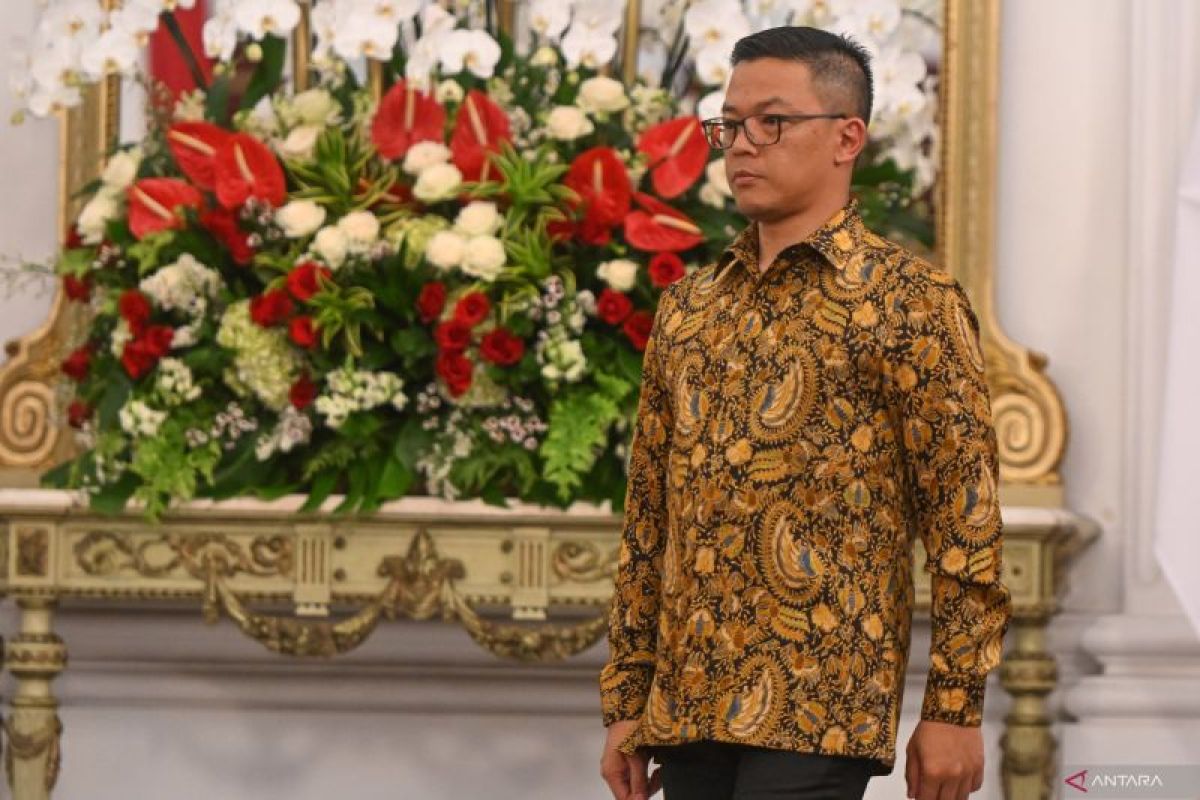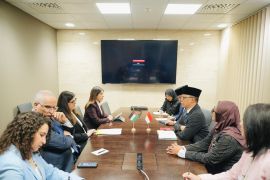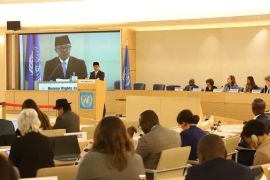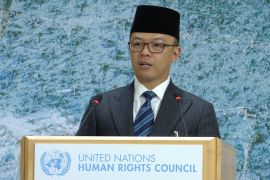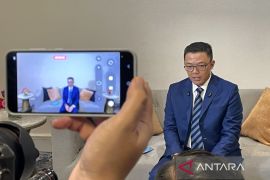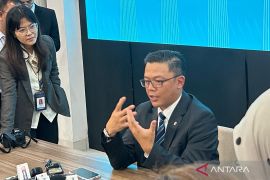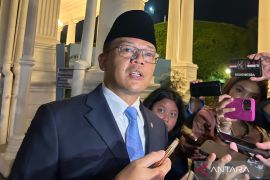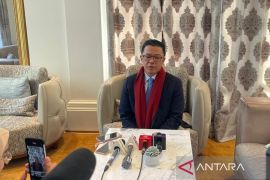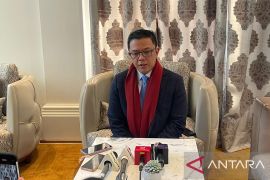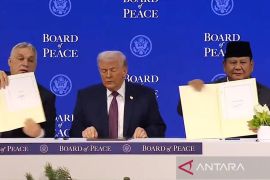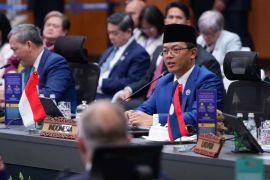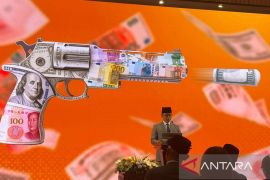Prabowo also appointed Anis Matta, Arrmanatha Nasir, and Arif Havas Oegroseno as deputy foreign ministers. They were inducted into the cabinet on October 21, the same day as Sugiono.
Sugiono’s appointment as foreign minister to succeed Retno Marsudi after her decade-long tenure in the ministry was largely consistent with rumors circulating in the public.
He had earlier expressed readiness to assist the government of President Prabowo and Vice President Gibran Rakabuming Raka in any position assigned to him.
"I am a soldier. Whatever task is given to me, I will carry it out as well as possible with full responsibility," he remarked after meeting Prabowo just a week before his induction.
Moreover, Sugiono had been tasked with welcoming state guests arriving in Jakarta on October 19 for the presidential inauguration ceremony the very next day. Other state guests were welcomed by ministers of the then-Onward Indonesia Cabinet of Joko Widodo.
At that time, he welcomed the Special Envoy for the United Arab Emirates President, Nahyan bin Mubarak Al-Nahyan, at the Soekarno-Hatta International Airport in Tangerang, Banten.
Sugiono was born in Takengon, a town in Aceh, on February 11, 1979. He completed his secondary education at the Taruna Nusantara High School in 1997. He was in the same school batch as Agus Harimurti Yudhoyono, currently the coordinating minister for infrastructure and regional development.
After completing high school, Sugiono went to a military college in the United States on a scholarship enacted by the then-commandant general of the Indonesian military's Special Forces Command (Kopassus), Prabowo Subianto.
He then continued his military career by enrolling in the Military Academy in Magelang, Central Java. Upon completion, he earned the second lieutenant rank in the infantry corps.
During his time in the Indonesian Army, Sugiono served as Prabowo’s personal assistant, which started Prabowo’s decades-long patronage to him.
He left the military and later joined his mentor in founding the Great Indonesia Movement (Gerindra) Party in 2008. Rising through the ranks in the party, he served as Gerindra’s Deputy Chairperson by 2020.
His political career soared upon his election to the House of Representatives (DPR) in 2019 to represent Central Java. He served as Gerindra Party’s parliamentary fraction chief in the People’s Consultative Assembly (MPR) from 2021 to 2024.
Based on his educational background and closeness to Prabowo Subianto, Sugiono was considered to be Prabowo’s “ideological child.”
Related news: Prabowo names Sugiono as foreign minister
The president’s vision
As Indonesia’s foreign minister, Sugiono is responsible for helming Indonesia’s diplomacy on the regional and global stage as mandated by Indonesia’s Constitution and for translating President Prabowo’s vision into diplomacy.
Moreover, the new president raised foreign policy issues in his inaugural address on October 20.
In his remarks, Prabowo affirmed that Indonesia’s foreign policy principles would remain “non-aligned, free and active,” meaning that Indonesia “will not join any military alliance.”
Indonesia will strive to be a friend to all nations and a good neighbor to countries in the Southeast Asian region.
Moreover, Indonesia remains steadfast in its rejection of colonialism and oppression. Indonesia “denounces racism and apartheid and is united to help oppressed people wherever in the world,” he stated.
“Hence, we are supporting the independence of the Palestinians,” Prabowo emphasized.
This excerpt from his inaugural speech gave the public a glimpse into how Indonesia's foreign policy would be shaped under Prabowo Subianto's leadership, serving as guidance for Foreign Minister Sugiono's future actions.
The president’s assertiveness on Indonesia’s foreign policy has been noticed by former deputy foreign minister and founder of the Foreign Policy Community of Indonesia (FPCI) Dino Patti Djalal.
“As president, Prabowo is likely to be more assertive on the international stage from his day one,” Djalal stated in his analysis after Prabowo became president-elect.
He contrasted Prabowo’s stance with his predecessor, Joko Widodo, who was less keen on diplomacy during his first five-year term.
Prabowo’s determination to make Indonesia more involved on the global stage was also apparent from the increase in his overseas visits while president-elect.
For instance, he conducted his Southeast Asian tour to Malaysia, Brunei, Laos, and the Philippines last September. Meanwhile, Sugiono was one of the officials who joined his entourage during the visits.
Related news: Indonesia keen to befriend all countries: President Prabowo
Strategic choice
Although the public correctly predicted the president’s choice for the foreign minister, Sugiono’s appointment still confounds some since he is not a career diplomat.
Addressing public concerns, Deputy Foreign Minister Arif Havas Oegroseno pointed out that most of Indonesia's past foreign ministers have come from non-diplomatic backgrounds. Ministerial appointments are also, ultimately, the president’s prerogatives.
This is despite him being cognizant that the last three foreign ministers in at least two decades were career diplomats.
Meanwhile, lecturer for international studies at Padjadjaran University Teuku Rezasyah opined that Sugiono’s appointment has a strategic purpose for Prabowo.
As a figure close to the president, he said, Sugiono “thoroughly understood the president’s ideas,” including his vision in diplomacy.
Rezasyah also highlighted Sugiono’s experience as deputy chair of Commission I of the DPR, overseeing foreign policy, had helped him hone his decision-making skills on key policies in the sector.
His chairmanship in the commission also bolstered his capability to work with all ministries and agencies overseen by Commission I, including the Foreign Ministry.
Despite lacking a diplomat background, Sugiono will not be burdened to fulfill his duties since the Foreign Ministry’s work and organizational culture are consolidated, strong, and adaptable.
“As he has deputy ministers picked from the ministry bureaucrats, Sugiono’s appointment is acceptable,” Rezasyah stated.
Sugiono is now Indonesia’s foreign minister. He is the face of Indonesia’s diplomacy on the global stage.
His work will not be easy, as he needs to fend off external challenges while advocating for the national interest in the world and continuing the successes achieved by Retno Marsudi, his immediate predecessor.
Related news: Indonesia remains committed to ASEAN amid new administration: FM
Editor: Yuni Arisandy Sinaga
Copyright © ANTARA 2024
